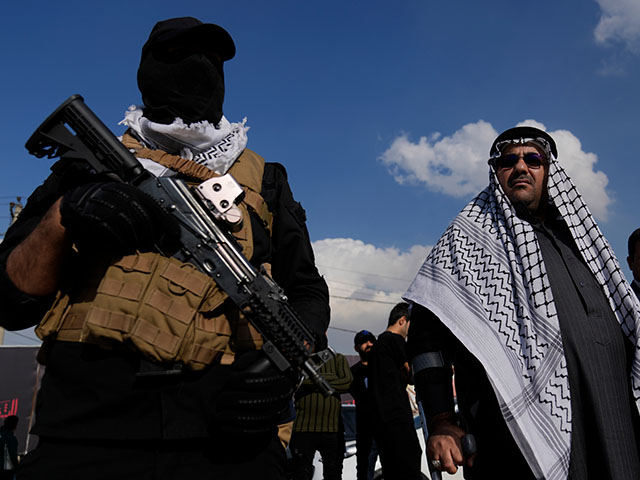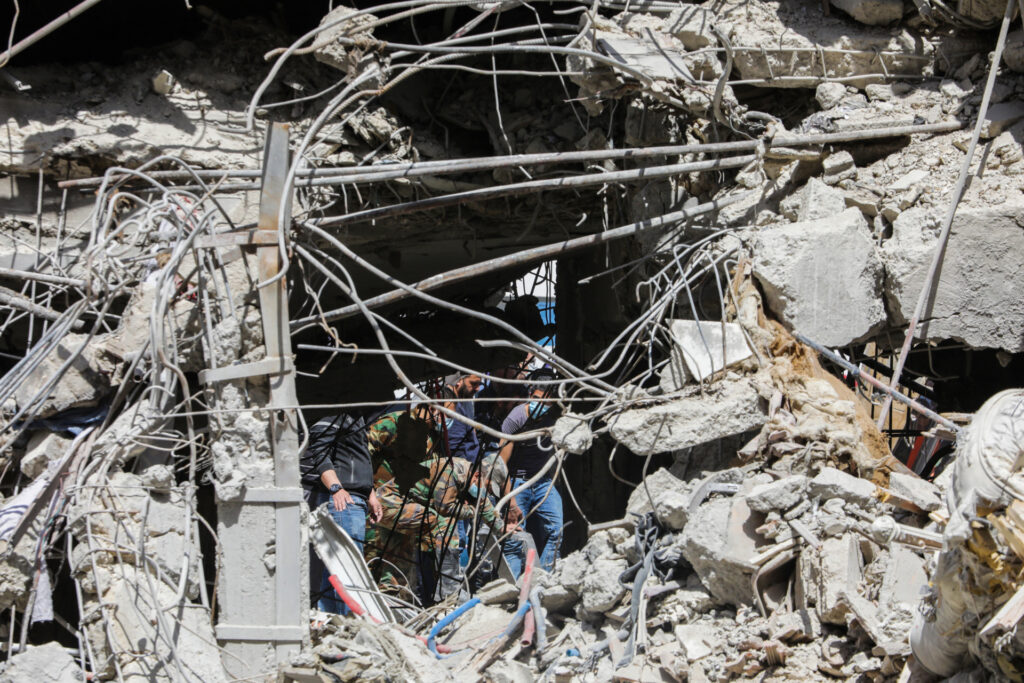The Islamic Resistance in Iraq (IRI), an umbrella group of Iran-backed Shiite militias that has been conducting terrorist attacks against American and allied forces in Iraq, claimed responsibility on Tuesday for five missile and drone strikes against targets in Israel.
Iraqi Shiite militia groups have launched hundreds of attacks against American targets since October, including a drone attack near the Syrian and Jordanian borders in January that killed three American service members. The most powerful of the Shiite militias, Kata’ib Hezbollah (KH), supposedly “suspended operations” against “occupying forces” after the January strike to avoid “embarrassing” the central government in Baghdad. However, KH resumed those operations in March, prompting a new round of retaliatory U.S. airstrikes.

Members of an Iraqi Shiite militant group attend the funeral of a fighter with Kata’ib Hezbollah who was killed in a U.S. airstrike in Baghdad, Iraq, on January 25, 2024. (AP Photo/Hadi Mizban)
The IRI issued two statements on Tuesday claiming to have attacked Israeli targets, such as the Ashkelon oil port and Hatzerim air base in Israel, supposedly on behalf of the Palestinian people. Iran and its network of terrorist proxies are seeking to halt Israel’s offensive against the Hamas terrorists in Gaza.
The IRI claimed it used “appropriate weapons” for the attacks and released footage of its forces launching a missile, ostensibly at Ashkelon. Israel has not reported any significant damage or loss of life from any of these attacks, which mostly seem to have involved individual or small groups of drones rather than ballistic missiles.
The Times of Israel (TOI) said there were “no reports of drone strikes” as of Sunday morning, although “rocket sirens did sound in the Golan Heights at 11:00 a.m. where one of the bases was located.”
“Israel has been bracing for Iranian retaliation after it allegedly struck a consular building in Damascus last week, killing senior members of Iran’s Islamic Revolutionary Guards Corps,” TOI noted.

Rescue workers search in the rubble of a building annexed to the Iranian embassy a day after an air strike in Damascus, Syria, on April 2, 2024. (LOUAI BESHARA/AFP via Getty Images)
Israel’s Red Sea port city of Eilat, which has been repeatedly attacked with missiles and drones from the Iran-backed Houthi insurgents of Yemen since the beginning of the Gaza conflict, was reportedly struck by a drone from Iraq on April 1.
The IRI claimed responsibility for that assault, which apparently ended when the drone plowed into a hangar at the Eilat naval base, causing what the Israel Defense Forces (IDF) characterized as “slight” damage to the building. The IRI claimed it was able to hit a “vital target” in Eilat, a phrase it uses in most of its statements.
Shortly before midnight on Monday, the IDF said its Iron Dome missile defense system was able to intercept a drone headed for Eilat that may have been launched from Iraq.
The two interceptor missiles, part of the C-Dome upgrade to the Iron Dome system, were launched from an Israeli corvette. Civilians on the beaches of Eilat observed the launch and interception.
Iranian state media reported on Saturday that Iran’s terrorist proxy in Lebanon, Hezbollah, plans to provide weapons to some 12,000 “Islamic resistance” fighters in Jordan in a strategy similar to Tehran’s arrangement with the IRI.
Iran’s ISNA news agency said:
This threat is about opening a broad front against the Zionist regime, which is probably the most dangerous of all fronts because it could geographically threaten all the cities of the occupied territories and could facilitate attacks against many of the most sensitive targets, including Tel Aviv and nuclear facilities.
Hezbollah representatives said they were ready to provide Jordanian terrorist forces with Iranian-provided “light and medium weapons, anti-armor weapons, advanced missiles, and millions of tons of explosives and ammunition.”

COMMENTS
Please let us know if you're having issues with commenting.